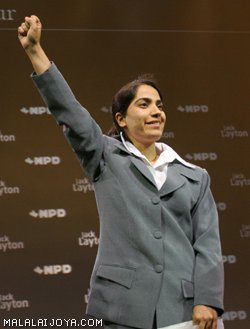Of all the compromises that might happen to keep a coalition alive, by far the most troubling is the one that is brewing on the war in Afghanistan. As news of the coalition began to surface in the last week of November, the Globe and Mail reported that "a senior NDP official said that no policy issues are considered deal breakers" including that of the war in Afghanistan.
This above all else has to be a "deal breaker." The NDP has been the one major party that has been committed to ending the war in Afghanistan. As this is being written, news came across the wires that three Canadian soldiers have been killed, taking the military death toll past 100. We don’t know how many Afghanis have been killed in the war – there is no official attempt to keep track.
No compromise is possible on war. You are either for it or against it. The Liberals began this war. The Liberals voted to extend it to 2011. We all know that it is an unwinnable war, fought for corporate profits and geopolitical power, not for democracy and human rights.
An anti-war party cannot stay anti-war and enter a cabinet with a pro-war party. Layton and the NDP leadership have to face up to the fact, that were the coalition to take office, the war in Afghanistan would become their war, and the deaths and injuries suffered in that conflict would be their responsibility.
Some will say that were the NDP to insist on this point, then the coalition would not be possible. That is probably true. But a coalition that includes "compromise" on Canada’s military adventure in Afghanistan is not a coalition worth having.
Canada is engaged in an imperialist adventure in Central Asia – part of the long slow re-militarization of Canada begun by the Liberals and continuing under the Tories. Opposition to this war is a matter of principle, not one of political expediency. Were Layton and the NDP leadership to compromise on this issue, it would do immeasurable damage to the anti-war movement in Canada – and ultimately to the NDP itself.
There is fear among millions in the face of an unfolding economic crisis. There is anger at the arrogance of a Tory minority that is pushing full steam ahead with neoliberalism at home and militarism abroad.
But it is no solution to replace Harper with a coalition government led by the other party of corporate power and of militarism – the Liberal Party of Canada. All that would be accomplished would be the burying of the independent voice of Canadian labour – the voice of the NDP – behind the pro-corporate voices of Michael Ignatieff and his colleagues.
If the coalition does not take office, we know the way forward. We need to build social movements against war in Afghanistan, against the militarization of Canadian society, against sending off working class men and women to die for corporate profits.
We need to build inside the workers’ movements, unions with the muscle to challenge the agenda of the corporations. Don’t bail out the auto companies – nationalize them and convert the jobs to green jobs, building public transit, building the infrastructure of a sustainable green economy. If the coalition does take office – the way forward is exactly the same.
We will be told that raising Afghanistan is divisive. So be it. We will demand that the coalition withdraw the troops immediately, even if that means the Liberals abandoning the coalition and the government falling. The only lasting basis for gains for working people and the poor is in building social movements that do not rely on manoeuvres at the top of the system.
The Liberals will say "but we are a party of peace, we didn’t go to war in Iraq." We will remind them that they were going full speed ahead to war in Iraq in 2003, until 400,000 people took to the streets – including two massive, beautiful demonstrations in Montreal – demanding that Canada stay out of that conflict. The Liberals reluctantly stayed out of the Iraq war because it would have been political suicide for them to join the Coalition of the Killing.
That is the way we will win progress whether it be a Harper government, or a Liberal/NDP government – by mobilizing on the streets and in the workplaces, whether the Prime Minister is Stephen Harper, or Stéphane Dion, or Bob Rae, or Michael Ignatieff.
Paul Kellogg is a teacher, researcher and writer. His focus is political economy (international and Canadian), globalization and social movements.



